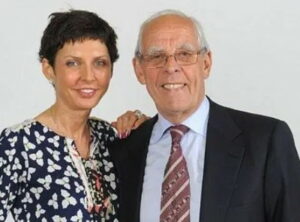 When it comes to revolutionising the world of online betting, few companies have done as much as bet365. Co-founded by Peter Coates and his daughter Denise, bet365 was famously based in a Portakabin during its formative years. Based in Stoke-On-Trent, Denise Coates created a sports betting platform and trading team on which to launch the business in March of 2001.
When it comes to revolutionising the world of online betting, few companies have done as much as bet365. Co-founded by Peter Coates and his daughter Denise, bet365 was famously based in a Portakabin during its formative years. Based in Stoke-On-Trent, Denise Coates created a sports betting platform and trading team on which to launch the business in March of 2001.
The company borrowed £15 million from the Royal Bank of Scotland, using the betting shop estate that Peter had started in 1974 before Denise took over the running of it in 1995 as the Managing Director.
Peter Coates has long been involved in more than just the betting industry. He was the Chairman of Stoke City Football Club, using his position to arrange sponsorship of the football club in 2012.
In 2016, bet365 also became the sponsors of the club’s stadium, which had previously been sponsored by Britannia Building Society. By 2022, Denise Coates was the Joint-Chief Executive and majority shareholder of bet365, running it alongside her brother John, whilst Peter Coates was the company’s Chairman. It is one of the biggest betting companies in the world, with offices in the likes of Australia and Bulgaria.
Peter Coates
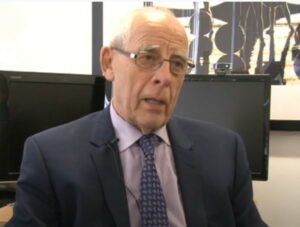 Born on the 13th of January in 1938, Peter Coates was, somewhat remarkably, the youngest of 14 children. His mother died when he was two, leaving his sister Irene to mostly bring him up in the family’s Stoke-on-Trent home. His father, Leonard, was a veteran of the First World War and a miner, boasting a keen interest in football and often attending matches at Stoke City’s Victoria Ground with his son. Peter signed as an amateur for Stoke in the 1950s, later admitting that he wasn’t quite ‘good enough’ to make it in the professional game.
Born on the 13th of January in 1938, Peter Coates was, somewhat remarkably, the youngest of 14 children. His mother died when he was two, leaving his sister Irene to mostly bring him up in the family’s Stoke-on-Trent home. His father, Leonard, was a veteran of the First World War and a miner, boasting a keen interest in football and often attending matches at Stoke City’s Victoria Ground with his son. Peter signed as an amateur for Stoke in the 1950s, later admitting that he wasn’t quite ‘good enough’ to make it in the professional game.
That didn’t mean that he gave up all hopes of playing the game, however. He did go on to play regularly for Goldenhill Wanderers and then Kidsgrove Athletic, but stopped playing the game at the age of 23. The family wasn’t a rich one, which perhaps isn’t all that surprising when you consider that there were 14 mouths to feed. As a result, Peter left school when he was 14 in order to get a job and earn money to help make ends meet. Once he was old enough, he signed up with the Parachute Regiment in order to compete his National Service, which was still a thing at the time.
When his National Service was over, Coates joined the Wimpy restaurant chain, working his way up to become a regional manager. He combined his restaurant experience with his love of sports, creating Stadia Catering, a company that specialised in catering events that took place at football grounds. After growing the business, it eventually merged with its chief competitor, Lindley Catering. The increase in revenue allowed Coates to purchase a chain of bookmaker shops, to which he gave the name Provincial Racing and that grew to boast 59 shops in the years that followed.
It is fair to say that Peter constantly looked to constantly invest his money in different projects, founding the radio station Signal 1 in 1983. It was this desire to be constantly improving that lead Coates to trust his daughter Denise when she wanted to launch the company that would later become bet365. He put his bookmaking business on the line to take a £15 million loan out with the Royal Bank of Scotland, but it was a decision that ultimately paid off. bet365 would grow to become one of the world’s biggest betting companies.
Peter Coates & Stoke City
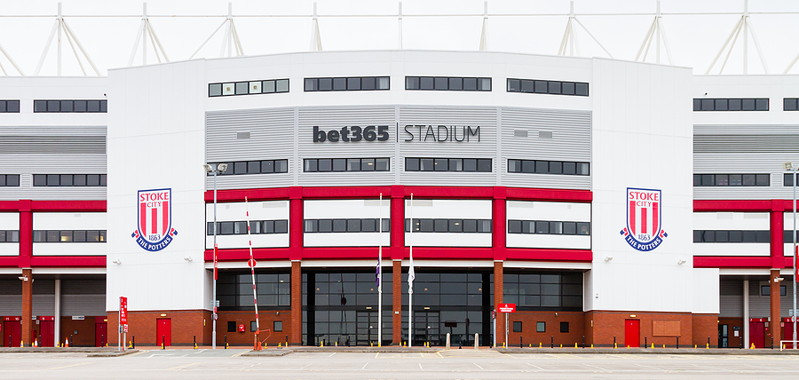
Of all of Coates’ various business dealings, none of them had the love that he had for Stoke City Football Club. His first financial dealings with the club occurred in 1986 when he became the majority shareholder, taking over from Sandy Clubb as the Chairman in September of that year. Stoke had been through a difficult time, with financial difficulties off the pitch being reflected in poor performances on it, culminating in a relegation from the First Division in 1985. Coates chose to back the manager Mick Mills for a promotion push, but they missed out and Mills needed to sell players to improve the squad.
Ahead of the 1989-1990 campaign, £1 million was spent by Stoke City, which included a club record fee of £480,000 on Ian Cranson. The results did not reflect the spending, however, and another relegation beckoned, seeing Stoke drop into the third tier. Boardroom changes ended up giving Coates more power, which he used to appoint Lou Macari as manager. It was a solid choice and Stoke gained promotion to the Second Division and won the Associate Members’ Cup. When Mark Stein was sold to Chelsea, however, supporter unrest was clear.
In the wake of the Taylor Report into the Hillsborough Disaster, it was felt by the board that upgrading the Victoria Ground to meet the requirements would be more costly than moving to a new stadium. So it was that the Britannia Stadium became the club’s new home, with the first season being a disaster. When the club lost 7-0 to Birmingham City, supporters invaded the pitch and tried to get into the director’s box, eventually leading to the resignation of Coates as the club’s Chairman, even though he remained the majority shareholder, with Keith Humphreys taking on the role.
In 1999, Coates choose to sell Stoke City to a consortium of Icelandic businessmen, led by Gunnar Gíslason. The deal was completed on the 15th of November 1999, costing the consortium around £3.5 million. Many thought that would be the end of Coates’ time at the club, but when Stoke failed to do anything other than consolidate its place in mid-table in the second tier of English football, the Icelandic ownership group decided to sell up. It was Coates that was there to buy it once more, paying £1.7 million through a subsidiary of bet365.
Second Spell In Charge
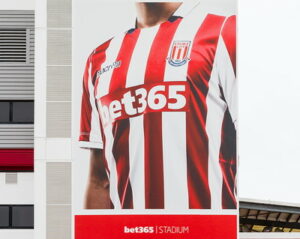 Ahead of the 2006-2007 season, Coates re-appointed Tony Pulis as manager, stating that the Icelandic ownership group had left the club ‘in a mess’, with debts of nearly £9 million. The club finished second in 2007-2008, gaining automatic promotion back to the Premier League. They survived the following season, defying the bookmakers that had made them favourites to be relegated. A club record fee of £8 million was paid for Kenwyne Jones in August of 2010, with the forward helping them to reach that season’s FA Cup final, which they lost 1-0 to Manchester City.
Ahead of the 2006-2007 season, Coates re-appointed Tony Pulis as manager, stating that the Icelandic ownership group had left the club ‘in a mess’, with debts of nearly £9 million. The club finished second in 2007-2008, gaining automatic promotion back to the Premier League. They survived the following season, defying the bookmakers that had made them favourites to be relegated. A club record fee of £8 million was paid for Kenwyne Jones in August of 2010, with the forward helping them to reach that season’s FA Cup final, which they lost 1-0 to Manchester City.
Coates once again gave the go-ahead to break the club’s transfer record in 2011-2012 when Stoke paid £10 million to sign Peter Crouch. When supporters understandably grew frustrated with the style of play that they had to watch the club playing under Tony Pulis, Coates decided to sack him and bring Mark Hughes in to replace him. The football improved, with Stoke City finishing 9th in the Premier League in 2013-2014, 2014-2015 and 2015-2016. The good times didn’t last, however, and when Stoke were in the relegation zone in 2017, Hughes was sacked and replaced by Paul Lambert.
Lambert couldn’t keep Stoke City in the Premier League and Gary Rowett replaced him as manager ahead of the following season. Even though £30 million was spent on new players, there was no promotion push from the club and so Rowett was replaced by Nathan Jones. They started the 2019-2020 campaign badly, with Coates bringing in Northern Ireland manager Michael O’Neill in November. He kept them in the Championship, with Coates appointing his son John as the club’s Joint-Chairman in September of 2020. At the time of writing, the club remains in the Championship.
Denise Coates
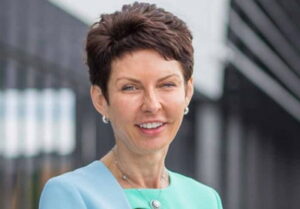 Born on the 26th of September 1967, Denise Coates is one of four children that Peter had with his wife Deirdre. The eldest daughter, she started work in the cashier’s department of her father’s bookmaking firm whilst still in school. This gave her a taste for two things: mathematics and the world of betting.
Born on the 26th of September 1967, Denise Coates is one of four children that Peter had with his wife Deirdre. The eldest daughter, she started work in the cashier’s department of her father’s bookmaking firm whilst still in school. This gave her a taste for two things: mathematics and the world of betting.
She attended the University of Sheffield, earning a First Class honours degree in econometrics. When she graduated from University, she returned to Provincial Racing as an accountant for the company, learning the ins and outs of the bookmaking business in a way that would later help her build a new business.
Coates eventually became the Managing Director of the small chain of shops and in 1995, the same year she was appointed to that position, she got a loan from Barclays to acquire a neighbouring chain of betting shops. In January of 2000, Denise Coates made a decision that would change her life forever. She purchased the domain name bet365.com, working out of a Portakabin at the time. By March of the following year, the internet was becoming the place to head if you wanted to have a wager on sporting events, so Coates made her move.
In launching bet365, Coates took what she herself referred to as the ‘ultimate gamble’. At the time, it was a new sports betting platform, leading the way that other companies would soon follow. Coates herself was a workaholic, working all hours in order to get the business off the ground. She combined the age-old betting industry, which had been around almost forever, with modern-era cutting-edge technology in order to make bet365 something totally different. It worked, with the company going on to become one of the biggest in the business whilst Coates herself became extremely rich.
In 2013, the company made a profit of £150 million, which came even after it had absorbed losses of £31 million incurred by Stoke City. She owns more than half of bet365, earning pay and bonuses of £5.4 million that year, on top of the £15 million share in dividends. It wasn’t the only time that she paid herself a large dividend, making the headlines in 2017 when she paid herself £217 million. By the following year, that had gone up to £265 million, which was about 9,500 times more than the average salary of British workers.
Coates obviously felt that she deserved to be paid a suitable wage, which was £421 million in 2020. That was higher than all of the FTSE 100 Index Chief Executive Officers combined. Appointed a Commander of the Order of the British Empire in 2012, she received an honorary doctorate from Staffordshire University in the same year. Perhaps somewhat unsurprisingly, she was inducted to the Sports Betting Hall of Fame, which is run by the Sports Betting Community, in 2019. Five years earlier, her and her husband Richard adopted four children from the same family, meaning they have five children.
Charity Work

Whilst many would be quick to criticise Coates, not least of all because she drives an Aston Martin with a personalised number plate, she has done plenty for charity over the years. In 2012, for example, she set up the bet365 Foundation, which was later renamed as the Denise Coates Foundation.
A registered charity under English law, it donated £100 million to twenty charities in the first couple of years of its existence. The likes of Oxfam and the Douglas Macmillan Hospice for cancer sufferers in Stoke have all received donations from the Foundation over the years.
Other decisions from the Foundation include a £230,000 donation to St Joseph’s College in Trent Vale in order to support vulnerable youngsters in Sierra Leone, as well as £235,000 granted to the New Vic Theatre in Newcastle-under-Lyme to help refurbish and redevelop it.
In 2020, Coates used the Foundation to donate £10 million to the University Hospitals of North Midlands in order to support staff that were fighting coronavirus. Whilst many would say that a woman that paid herself £421 million that year can afford to make charitable donations, not all rich people do the same and so she should be commended.